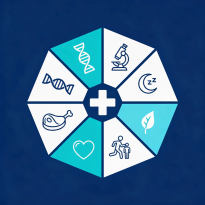Food and Supplements: Timing and Portion Are More Important Than Variety
For the original Korean text, visit here.
If you’re curious about the basics of traditional Korean medicine and health, read the following article:
What Your Sleeping Position Says About Your Health
Learn Why Studying JangSang Medicine is Important.
Frequently Asked but Silly Questions (Foods Good for the Liver??)
Thank you for reading.
Introduction: Personal Experience with Herbal Medicine
Recently, I started taking traditional herbal medicine and experienced something eye-opening.
Despite carefully selecting the right formula, Palmugeonjatan (a traditional Korean herbal prescription), I felt constant discomfort after taking it. It seemed like a perfect fit for my condition, yet my body rejected it.
After several trials, I realized the issue wasn’t with the medicine itself but with the dosage.
I gradually reduced the amount until I was taking just one-fourth of the original dosage — the amount typically prescribed to a 4-year-old child.
To my surprise, this tiny dose worked wonders. My body absorbed it better, and I began to notice positive effects.
The lesson? Portion size matters.
In my case, my digestive system seemed to function at the level of a 4-year-old.
This experience sparked a deeper reflection on food, supplements, and health — and how much we consume matters more than we realize.
Common Health Concerns in Modern Life
When searching for health tips related to aging, wellness, or dieting, most people focus on questions like:
- What should I eat to improve my health?
- What’s the best way to prepare healthy meals?
- Are supplements more effective than natural foods?
These are valuable questions, but they often overlook a more critical factor: The amount and timing of food consumption are more important than its type or quality. In today’s world of abundance, where food is easily accessible, it’s not about what you eat but how much and when you eat.
The Balance Between Positive Energy (正氣) and Harmful Energy (邪氣) in Traditional Medicine
In traditional Korean medicine, the body’s essential energy is called Jeonggi (正氣), representing the life force that sustains health. In contrast, Sagi (邪氣) refers to harmful energy that causes illness. In the past, when people lived in harsher environments with limited access to clean food, water, and shelter, the distinction between Jeonggi and Sagi was straightforward.
- Jeonggi sources: Fresh food, clean water, and a healthy living environment
- Sagi sources: Contaminated food, polluted water, and poor living conditions
However, in today’s world, most people in developed countries have access to fresh food, clean water, and comfortable living spaces. Yet, many still suffer from illnesses caused by Sagi. Why? The issue lies not in the quality of what we consume but in the quantity and timing.
Too Much of a Good Thing Can Be Harmful
Even the healthiest foods can turn into toxins if consumed in excess. Modern-day Sagi doesn’t come from spoiled or contaminated food but rather from overconsumption and poor timing. Interestingly, the same energy source can either promote health (Jeonggi) or cause harm (Sagi), depending on how it’s managed. For example:
- A balanced meal at the right time provides Jeonggi.
- The same meal consumed too frequently or in large quantities can stagnate in the body, turning into Sagi.

Modern Abundance: A Double-Edged Sword
We live in an era of unprecedented abundance. For the first time in human history, people have constant access to diverse foods and supplements. However, our bodies are not biologically adapted to handle this abundance. Throughout history, humans faced food scarcity, and their bodies evolved to store nutrients whenever food was available. This instinct to store energy during times of abundance has not disappeared. The problem is, we no longer face food shortages. As a result, our bodies continue to store energy unnecessarily, leading to:
- Obesity
- Inflammation
- Metabolic disorders
- Chronic diseases
The key question is no longer “What should I eat?” but rather: 👉 “How much should I eat, and when should I stop eating?”
The Concept of Fasting: Returning to Our Natural Rhythm
Given our evolutionary history, it makes sense to reconsider our approach to eating. Instead of focusing solely on what to eat, we should pay more attention to when to eat and when to refrain from eating. Intermittent fasting is one approach that aligns with this natural rhythm. By allowing the body time to rest and process stored energy, you can reduce the risk of energy stagnation (Sagi) and improve overall health. Here are some practical tips:
| Tip | Why It Matters |
|---|---|
| Eat smaller portions | Prevents energy stagnation and improves digestion |
| Pay attention to timing | Supports natural metabolic cycles |
| Practice fasting | Gives the body time to reset and eliminate toxins |
| Avoid overeating | Prevents excess energy from turning into Sagi |
Rethinking Supplements and Health Foods
Many people rely on supplements and superfoods to boost their health. But these can also become harmful if taken in excessive amounts or at the wrong times. For example:
- Vitamin C is essential for health, but too much can cause kidney stones.
- Protein supplements can support muscle growth, but overconsumption may harm the kidneys.
The solution? 👉 Focus on moderation and timing rather than quantity. Supplements should complement a balanced diet, not replace it.
Conclusion: Timing and Portion Control Are Key to Health
In today’s world of abundance, the biggest challenge isn’t finding healthy food but managing how much and when we consume it. Our ancestors lived in times of scarcity, and their bodies adapted to store energy whenever food was available. But in our modern era, this survival mechanism works against us. To maintain optimal health:
- Eat in moderation.
- Pay attention to timing.
- Practice fasting when necessary.
Remember, even the best foods and supplements can become harmful if consumed in excess. The secret to long-term health isn’t found in any single food or supplement — it’s in mastering portion control and timing.
Key Takeaway:
Modern health issues often stem not from what we eat but from how much and when we eat. Adapting to this understanding can lead to a healthier, more balanced life.
Get LIFETIME ACCESS to “My Private Prompt Library”: 👉 https://buymeacoffee.com/mtspromptslibrary/e/236177 By-pass All Content Detectors (Guaranteed Results): 👉 https://stealthwriter.ai/?linkId=lp_731486&sourceId=muhammad-talha&tenantId=stealthwriter Looking for a custom GPT? Or SEO services for your website? 👉 Book a Consultation: https://bit.ly/4bgdMGc
